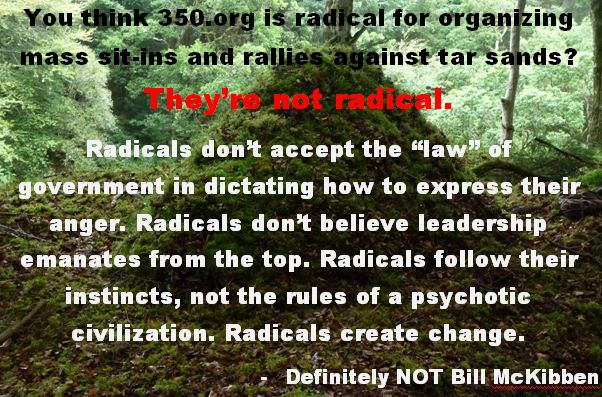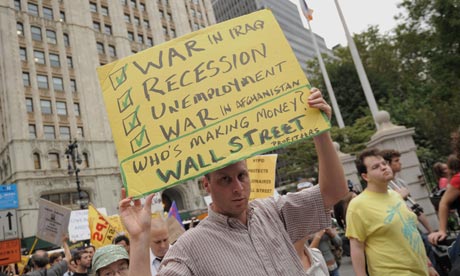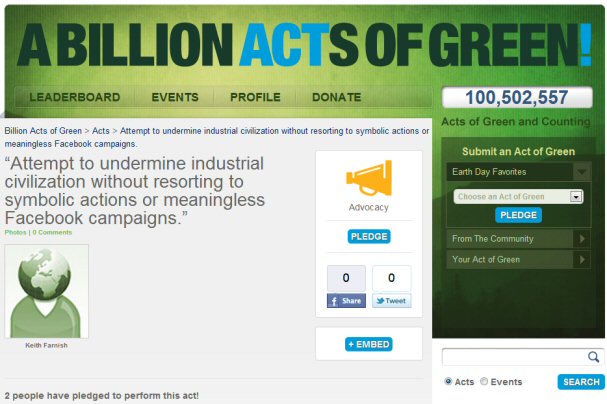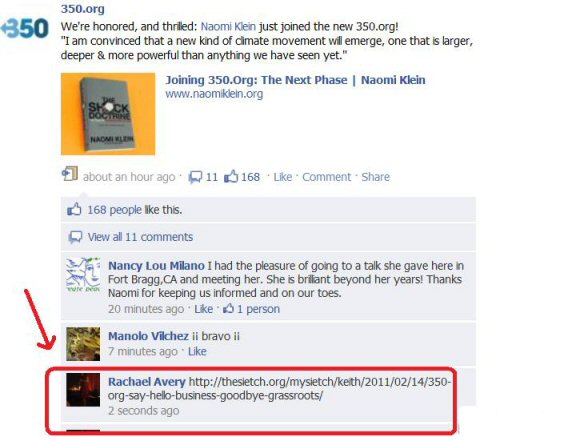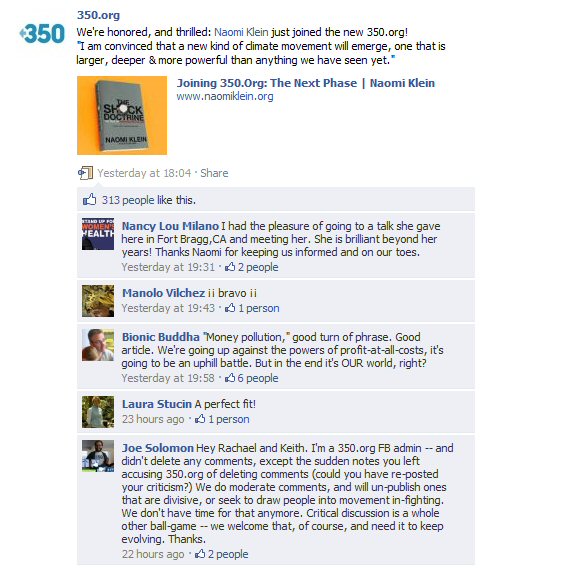
Climate reality writer and activist Gregory Vickrey. (L) ( Photo: Justin Sullivan/Getty Images)
Founder of 350.org, writer and environmentalist Bill McKibben. (R) (Photo: Nancie Battaglia /
350.org)
Bill McKibben, Schumann distinguished scholar at Middlebury College, is the author of a dozen books about the environment, including “The End of Nature” (1989), regarded as the first book for a general audience about global warming. He is also founder of the global grassroots climate movement 350.org, which organized what CNN called “the most widespread day of political action in the planet’s history.” Most recently, he was the recipient of the annual $100,000 Puffin/Nation Prize for Creative Citizenship. Of this honor, McKibben said:
“I’m a beginner as an organizer; it’s a great honor to be included on this list of people who have changed America for the better. I am deeply grateful to The Puffin Foundation and The Nation Institute for this recognition of my work. I am even more appreciative that this award is representative of a shared conviction that now is a singular moment in our history for all people of good conscience to come together in defense of the planet. Our work has never been more urgent.”
Gregory Vickrey, Peace of the Action distinguished board member and generally unknown writer and activist, is the author of not a few critiques of environmental organizations, including “Environmentalism is Dead”, likely one of the least read articles on Counterpunch, ever. He has been lucky to work with Cory Morningstar of Canadians for Action on Climate Change; otherwise, he’d be extra-unknown. Most recently, he was the recipient of the $0 Peanut Butter Subsistence Prize. Of this honor, Vickrey said:
“It sucks to be broke and targeted, but what can I do? The entire world is at stake. So few of us stick to our guns and speak the truth about climate change – recognizing it as the greatest crime against humanity in history – I’d hate to cull myself from that group. Even if it meant I could also afford jelly on occasion.”
On that note, I interviewed Bill McKibben and Gregory Vickrey and would like to share our conversation with you.
Mickey Z.: You’ve noted that this award highlights your shift from writer to organizer. Can you tell us more about how and why you made that shift?
Bill McKibben: At some point, it became obvious to me that we were losing badly in the global warming fight, and that one reason was we had no movement. All the scientific studies and policy plans on earth don’t get you very far if there’s no movement to push them. So we’re doing our best to build that – too late and too slowly, but as best we can.
Gregory Vickrey: I think Bill is genuine here. He did realize we are losing badly in the global warming fight – and we still are. It is important to question ourselves when we endeavor to build a movement. In Bill’s case, I think one of the first questions was funding. And that’s can be a dangerous question, especially when one considers the history of the environmental movement, and even recently sees organizations like The Nature Conservancy cutting deals with Dow Chemical. Unfortunately, with the incarnations of what was to become 350.org, we find seed money from the likes of Rockefeller Brothers Fund (think big oil), and we find a pronounced effort to create a brand, rather than a movement – and that strategy was created by Havas, one of the world’s largest marketing firms.
MZ: Of your work, Derrick Jensen has said: “One of the problems that I see with the vast majority of so-called solutions to global warming is that they take industrial capitalism as a given and the planet which must conform to industrial capitalism, as opposed to the other way around.” How do you respond to this critique?
BM: It strikes me that the single biggest variable explaining the structure of the world today is the availability of cheap fossil fuel – that’s what happened two hundred years ago to create the world we know, especially its centralization. I think if we can put a serious price on fossil fuel, one that reflects the damage it does to our earth, then the fuels that we will depend on – principally wind and sun – will push us in the direction of more localized economies. Those kind of changes have been the focus of my work as a writer in recent years.
GV: What strikes me is that Bill did not respond to the question that was asked. What Bill says instead is that we should depend upon the political system that got us into this mess to get us out of it by taxing the crap out of fossil fuels. Unfortunately, we could elect Bill (or me!) as president and we still wouldn’t get the policy in place to force corporations to kill the carbon economy. Jensen is on point with the quote you provided, and Bill and corporate brand 350.org ignore that part of reality.
MZ: So many people believe they’re already “doing their part,” e.g. recycling, using CFL bulbs, bringing their own bag to the grocery store etc. How do we help them see ASAP that this isn’t even remotely enough?
BM: Well, I think we keep encouraging them to become politically active too, not instead. It’s good to do what you can around your house; and our job is to help people realize that there are ways they can be effective in a larger sphere too. That’s what movements are. And especially with climate change, the feeling that you’re too small to make a difference can be crippling.
GV: This is another arena where Bill has no forthright response at the ready, because he and 350.org are not in the business of systemic change. They believe in green capitalsm, so changing light bulbs is good, recycling is good, etc. See, the “feel good” in recycling allows us to continue consuming at preposterous rates. Changing light bulbs damns us to suffer Jevons Paradox, and corporations love that. So 350.org loves that. Instead, we should be making people aware of reality: our only chance is effective zero carbon emissions, and we must get there in a matter of years. That means dramatic systemic change. That means drastic lifestyle changes. It’s apolitical, in the end, because Mother Nature doesn’t care about having a seat at the table in DC. She doesn’t need it.
MZ: The US Department of Defense is the world’s worst polluter, the planet’s top gas guzzler, and recipient of 53.3 percent of American taxpayer dollars. How does your work address this situation and the concurrent “untouchable” status the US military has among the majority of American citizens?
BM: I’m not sure it really does, directly. Indirectly, I think the biggest reason we have the oversized defense that we do is that we rely on distant and unstable sources of energy as the core of our economy. I remember one sign in particular from the early Anti-Iraq-War rallies I went to: “How did our oil end up under their sand?”
GV: Bill’s work doesn’t address militarism at all. We need to drastically cut military spending in order to subsidize systemic change in the short term, and that mechanism is the fastest way to start cutting carbon. You won’t find that on the 350.org website.
MZ: Since 51 percent of human-created greenhouse gases come from the industrial animal food business, are you encouraging people to adopt a plant-based diet lifestyle?
BM: I’ve written time and again that industrial agriculture, especially factory livestock farming, is a bane – not only for its greenhouse gases, but for myriad other reasons. Interestingly, though, scientific data from the last couple of years is leading to the conclusion that local, grasspastured, often-moved livestock, by the action of their hooves and the constant deposition of manure, improve soils enough to soak up more carbon and methane than they produce. (This would explain why, say, there could have been more ungulates on the continent 300 years ago than now without it being a curse to the atmosphere). So there may be hope for meat-eaters as well – but only if you know and understand where your dinner is coming from.
GV: Again, Bill misses the point. Beyond eliminating militarism, we can cut into our carbon budget most drastically and immediately by scrapping the agro-meat industry. In time, Bill’s scenario providing hope for voracious meat eaters may come into effect, but we do not have the time to gradually shrink agro-meats. If we implement a strategy of incrementalism here, we are doomed to suffer the worst effects of climate change.
MZ: Is there a question you’ve always wished to be asked during an interview? If so, please feel free to ask and answer now.
BM: I’ve … done a lot of interviews.
GV: How do we get to zero? In short, the United States, Canada, and Australia must get to zero emission before 2020, with most of the cuts occurring over the next 5 years. Europe, Japan, China, India, and a few other countries must accomplish the same before 2025. The rest of the developing world must accomplish the same before 2030. Even in the best of circumstances, this scenario does not protect us from the feedback loops that are not included in any of the predictive models. But it gives us our best shot. Assuming policy-makers balk at this, we need an all-out global uprising to overcome, overwhelm, and overtake the system, and to be prepared for massive sacrifice. The system and its masters will not be easily returned to the masses. We must give them no choice.
MZ: What do you like to do when not engaged in writing, organizing and activism? What inspires you outside of those realms?
BM: I like to be outdoors – cross-country skiing most of all, or hiking. That’s why I live in the woods. And that’s why it’s tough to be on the road so much organizing. But I love the people, especially the young people, who are my colleagues.
GV: I chase dogs and kids and soccer balls. I succumb to the “need” of college basketball. I wonder where my next meal is coming from.
MZ: How can readers connect with you and get involved with your work?
BM: By going to 350.org and signing up. We spent what little money we had on a website; it works in about a dozen languages, and we think it’s pretty sharp.
GV: People can learn more about Bill’s work here and here. People can go to my website to get in touch and learn more about climate reality; it works in one language – occasionally two when I can manage to get a translator – and it’s pretty sharp considering I still owe the guy who helped me with it some cash. Maybe I can fix him a peanut butter sandwich instead.
Note: The preceding interview is not real. Mickey Z. and Bill McKibben held an interview that may be found here; their sections remain the same. Gregory Vickrey’s sections are a fictitious addition meant to bring the reality of corporate brand 350.org to the fore, and to urge everyone to get serious about climate change. Wake up. Tear down. Rise up.





